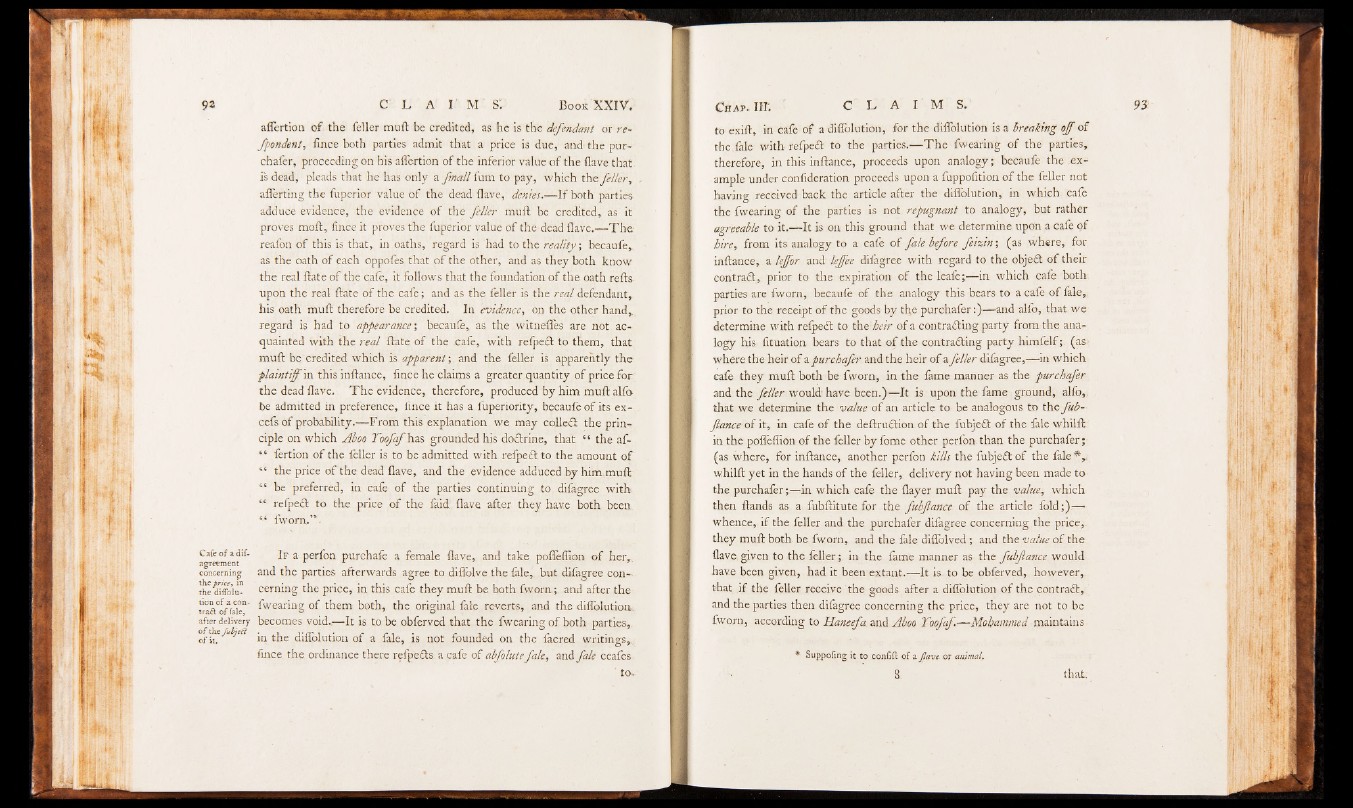
92 C L A I M S'. Book XXIV,
Cafe o f a dif-
agreement
concerning
the pricet in
the diffolu-
tion o f a contrail
o f fale,
after delivery
o f the fuhjeft
o f it.
aflertion of the feller muft be credited, as he is the defendant or re-
fpondent, fince both parties admit that a price is due, and the pur-
chafer, proceeding on his aflertion of the inferior value of the flave that
is dead, pleads that he has only a fmall fum to pay, which the feller,
aflerting the fuperior value of the dead flave, denies.— If both parties,
adduce evidence, the evidence of the feller muft be credited, as it
proves moft, fince it proves the fuperior value of the dead flave.— The-
reafon of this is that, in oaths, regard is had to the reality; becaufe,
as the oath of each oppofes that of the other, and as they both know
the real ftate of the cafe, it follows that the foundation of the oath refts.
upon the real ftate of the cafe; and as the feller is the real defendant,
his oath muft therefore be credited. In evidence, on the other hand,,
regard is had to appearance; becaufe, as the witnefles are not acquainted
with the real ftate of the cafe, with refpeft to them, that
muft be credited which is apparent; and the feller is apparently the
plaintiff in this inftance, fince he claims a greater quantity of price for
the dead flave. T h e evidence, therefore, produced by him muft alfo
be admitted in preference, fince it has a fuperiority, becaufe of its ex-
cefs of probability.— From this explanation we may colledi the principle
on which Aboo Toqfafhas grounded his doctrine, that “ the af-
“ fertion of the feller is to be admitted with refpect to the amount o f
“ the price of the dead flave, and the evidence adduced by him,muft
“ be preferred, in cafe of the parties continuing to difagree with
“ refpeft to. the price of the laid Have, after they have both been.
“ fworru” '-
I f a perfon purehafe a female flave, and take pofleflion of her,.,
and the parties afterwards agree to diflblve the lale, but difagree concerning
the price, in this cafe they muft be both fworn; and after the
fwearing of them both, the original fale reverts, and the diflolution.
becomes void..— It is to be obferved that the fwearing o f both parties,,
in the diflolution of a fale, is not founded on the facred writings.,
fince the. ordinance there refpefts a cafe of abfolute fale, and fale ceafesto
Chap. HI'. C L A I M S. 93
to exift, in cafe of a diflolution, for the diflolution is a breaking off of
the fale with refpeft to the parties.— T h e fwearing of the parties,
therefore, in this inftance, proceeds upon analogy; becaufe the .example
under confideration proceeds upon a fuppofition of the feller not
having received back the article after the diflolution, in which cafe
the fwearing of the parties is not repugnant to analogy, but rather
agreeable to it.— It is on this ground that we determine upon a cafe of
hire, from its analogy to a cafe of fale before fei%in\ (as where, for
inftance, a leffor and leffee difagree with regard to the objeft of their
contract, prior to the expiration of the leafe;— in which cafe both
parties are fworn, becaufe of the analogy this bears to a cafe of fale,
prior to the receipt of the goods by the purchafer:)— and alfo, that we
determine with refpeft to th€heir of a contracting party from the analogy
his fituation bears to that of the contracting party himfelf;. (as-
where the heir of a purchafer and the heir of a feller difagree,— in which
cafe they muft both be fworn, in the lame manner as the purchafer
and the feller would' have been.)— It is upon the lame ground, alfo,,
that we determine the value of an article to be analogous to the fub-
Jlance of it, in cafe of the deftruCtion of the fubjedt of the fale whilft:
in the pofleflion of the feller by fome other perfon than the purchafer;
(as where, for inftance, another perfon kills the fubjedtof the fale*,.,
whilft yet in the hands of the feller, delivery not having been made to
the purchafer;—in which cafe the flayer muft pay the value., which
then Hands as a fubftitute for the fubfance of the article fold;):—
whence, if the feller and the purchafer difagree concerning the price,,
they muft both be fworn, and the fale diflolved; and the value of the
Have, given to the feller; in the fame manner as the fubflance would
have been given, had it been extant.— It is to be obferved, however,
that if the feller receive the goods after a diflolution o f the contract,
and the parties then difagree concerning the price, they are not to be
fworn, according to Aaneefa. and Aboo Yoofaf.— Mohammed maintains-
*■ Suppofing it, to confift of a flave or animal.
a that